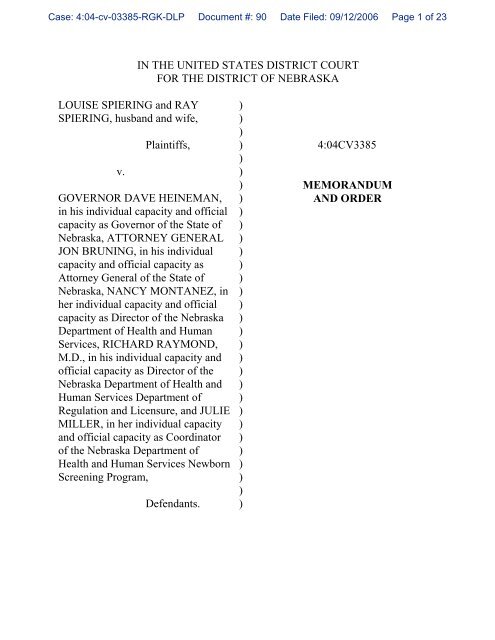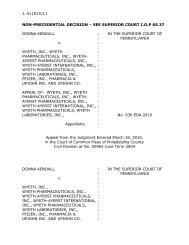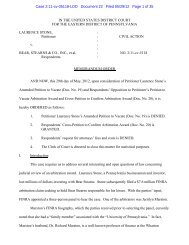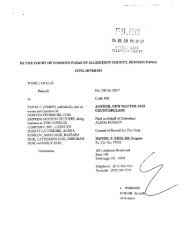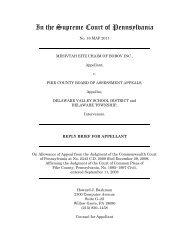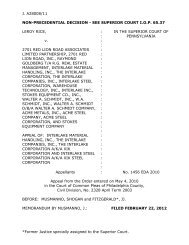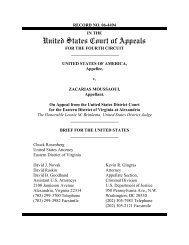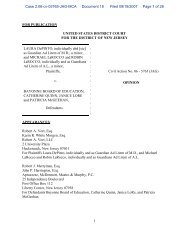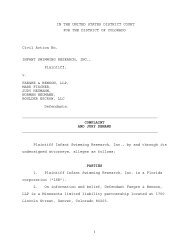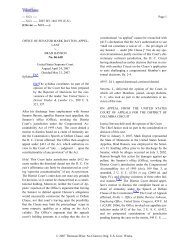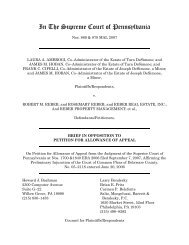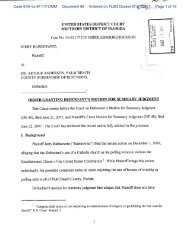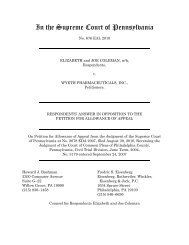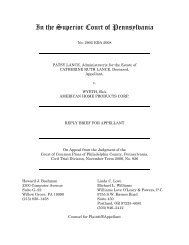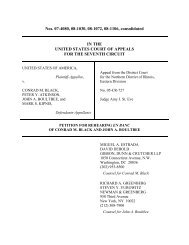Spiering v. Heineman - How Appealing - Law.com
Spiering v. Heineman - How Appealing - Law.com
Spiering v. Heineman - How Appealing - Law.com
Create successful ePaper yourself
Turn your PDF publications into a flip-book with our unique Google optimized e-Paper software.
Case: 4:04-cv-03385-RGK-DLP Document #: 90 Date Filed: 09/12/2006 Page 1 of 23<br />
LOUISE SPIERING and RAY<br />
SPIERING, husband and wife,<br />
v.<br />
IN THE UNITED STATES DISTRICT COURT<br />
FOR THE DISTRICT OF NEBRASKA<br />
Plaintiffs,<br />
GOVERNOR DAVE HEINEMAN,<br />
in his individual capacity and official<br />
capacity as Governor of the State of<br />
Nebraska, ATTORNEY GENERAL<br />
JON BRUNING, in his individual<br />
capacity and official capacity as<br />
Attorney General of the State of<br />
Nebraska, NANCY MONTANEZ, in<br />
her individual capacity and official<br />
capacity as Director of the Nebraska<br />
Department of Health and Human<br />
Services, RICHARD RAYMOND,<br />
M.D., in his individual capacity and<br />
official capacity as Director of the<br />
Nebraska Department of Health and<br />
Human Services Department of<br />
Regulation and Licensure, and JULIE<br />
MILLER, in her individual capacity<br />
and official capacity as Coordinator<br />
of the Nebraska Department of<br />
Health and Human Services Newborn<br />
Screening Program,<br />
Defendants.<br />
)<br />
)<br />
)<br />
)<br />
)<br />
)<br />
)<br />
)<br />
)<br />
)<br />
)<br />
)<br />
)<br />
)<br />
)<br />
)<br />
)<br />
)<br />
)<br />
)<br />
)<br />
)<br />
)<br />
)<br />
)<br />
)<br />
)<br />
)<br />
)<br />
)<br />
)<br />
4:04CV3385<br />
MEMORANDUM<br />
AND ORDER
Case: 4:04-cv-03385-RGK-DLP Document #: 90 Date Filed: 09/12/2006 Page 2 of 23<br />
Loving parents want to delay the state-mandated testing of their newly born<br />
infants for metabolic diseases because of their sincere religious beliefs and because<br />
of their equally sincere and related concern for the health of their children. Just as<br />
<strong>com</strong>mitted to the well-being of newborns, the State of Nebraska refuses to<br />
ac<strong>com</strong>modate the family. Nebraska fervently believes that such an ac<strong>com</strong>modation<br />
would harm children.<br />
Realizing that there is very little law on the subject, I decide that Nebraska’s<br />
newborn testing regime, as now constituted, 1 survives the plaintiffs’ challenge.<br />
I. BACKGROUND<br />
Cross-motions for summary judgment have been filed. The plaintiffs’<br />
statement of undisputed facts appears at filing 76, pages 1-7, and the defendants’<br />
statement of undisputed facts appears at filing 70, pages 1-5.<br />
Since neither side contested the opponent’s facts, all of them are admitted. See<br />
NECivR 56.1. Unless a more specific citation is given, the facts recounted below are<br />
derived from the parties’ statements of undisputed fact. I find the following facts to<br />
be the material ones:<br />
1 Nebraska changed its regulatory scheme after I issued a temporary restraining<br />
order. (See Filing 8.) Thereafter, the plaintiffs abandoned their claim for money<br />
damages, but they did not abandon their claim for attorney fees. (Filing 39.) The<br />
pending motions for summary judgment do not address whether the plaintiffs are<br />
entitled to attorney fees because they obtained a temporary restraining order or<br />
because Nebraska apparently changed its regulations as a result of that temporary<br />
order. Thus, I will request additional advice from the lawyers as to these issues.<br />
-2-
Case: 4:04-cv-03385-RGK-DLP Document #: 90 Date Filed: 09/12/2006 Page 3 of 23<br />
The <strong>Spiering</strong>s and Their Religious Beliefs<br />
1. Although they are not formally members of the church (filing 79 ¶ 5),<br />
Ray and Louise <strong>Spiering</strong> follow the teachings of Scientology as they understand those<br />
teachings. They are sincere in their beliefs. That said, I do not determine whether the<br />
<strong>Spiering</strong>s correctly understand and follow the true doctrines of Scientology.<br />
“[C]ourts must not presume to determine the place of a particular belief in a religion<br />
or the plausibility of a religious claim.” Employment Div., Dep’t of Human Res. of<br />
Oregon v. Smith, 494 U.S. 872, 887 (1989) (the Free Exercise Clause permits a state<br />
to prohibit sacramental peyote use and thus to deny unemployment benefits to<br />
persons discharged for such use).<br />
2. The <strong>Spiering</strong>s’ religious beliefs include the concept of “Silent Birth.”<br />
Based on this religious tenet, and among other things, they believe that parents should<br />
insulate their newly born infants from pain during the birth process and for a period<br />
of seven days after birth. The <strong>Spiering</strong>s sincerely believe that subjecting a child to<br />
the pain and trauma of a blood draw within seven days of birth violates the religious<br />
precept of “Silent Birth” and could cause the child to later suffer physical or mental<br />
injury.<br />
3. The <strong>Spiering</strong>s are sexually active. They do not use birth control<br />
measures. Given the difficulty that the <strong>Spiering</strong>s experienced with Nebraska over the<br />
birth of their fourth child (discussed next), and the real possibility that Mrs. <strong>Spiering</strong><br />
may be<strong>com</strong>e pregnant again, this case presents a live controversy, this case is ripe and<br />
it is not moot.<br />
The <strong>Spiering</strong>s’ Four Children and the Temporary Restraining Order (TRO)<br />
4. The <strong>Spiering</strong>s have four children. The <strong>Spiering</strong>s have no family history<br />
of any of the disorders screened for by the State of Nebraska.<br />
-3-
Case: 4:04-cv-03385-RGK-DLP Document #: 90 Date Filed: 09/12/2006 Page 4 of 23<br />
5. The oldest child was born in Minnesota and the <strong>Spiering</strong>s were allowed<br />
to opt out of testing based upon their religious beliefs. In contrast, and despite the<br />
fact that all states require some type of testing, Nebraska is one of the few states that<br />
do not allow an exemption for testing based upon religious grounds. 2<br />
6. The next two children were born in Nebraska. Although they would<br />
have preferred to wait seven days, through the help of their physician, the <strong>Spiering</strong>s<br />
were able to delay testing for these children for five days.<br />
7. The <strong>Spiering</strong>s’ fourth child was the original focal point of this litigation.<br />
When the <strong>Spiering</strong>s learned that their physician would no longer help them delay<br />
testing, and prior to the birth of their fourth child, they filed suit.<br />
8. On December 17, 2004, and presented with the impending birth of the<br />
fourth child, I granted a TRO prohibiting Nebraska from enforcing its then current<br />
regulations regarding metabolic testing against the <strong>Spiering</strong>s until the eighth day after<br />
the plaintiff’s fourth child was born. (Filing 8.) In that decision, I emphasized that<br />
“my mind may well be changed by a better developed record and briefing.” (Id. at 3.)<br />
Nonetheless, I was particularly concerned that Nebraska’s regulatory scheme, as then<br />
constituted, contained an odd quirk. If the child was born in a hospital, a blood draw<br />
for testing was required within 48 hours, but if the child was born at home, the blood<br />
draw could be <strong>com</strong>pleted seven to ten days after the child was born. Despite this<br />
difference, Nebraska refused to ac<strong>com</strong>modate the <strong>Spiering</strong>s’ desire to delay the<br />
testing of their infant for seven days. The practical result of Nebraska’s position was<br />
to force Mrs. <strong>Spiering</strong> to give birth at home rather than in a hospital if she desired to<br />
2 See Francy E. Foral, Necessity’s Sharp Pinch: Parental and States’ Rights in<br />
Conflict in an Era of Newborn Genetic Screening, 2 J. Health & Biomedical L. 109,<br />
111, 121 (2006) (all states mandate testing, but some have exemptions). According<br />
to this <strong>com</strong>mentator, Nebraska, Michigan, Minnesota, Montana and South Dakota do<br />
not provide a religious exemption. Id. at 121 n.82.<br />
-4-
Case: 4:04-cv-03385-RGK-DLP Document #: 90 Date Filed: 09/12/2006 Page 5 of 23<br />
follow her religious beliefs. Because the “born-at-home” exception seemed unrelated<br />
to the health of the infant or the health of the mother and because it also provided an<br />
unintended incentive to Mrs. <strong>Spiering</strong> to endanger herself and her infant, I granted<br />
temporary relief. Nonetheless, I ordered the <strong>Spiering</strong>s to have their child tested as<br />
soon as possible after the seventh day.<br />
9. Shortly after I issued the temporary restraining order, the <strong>Spiering</strong>s’<br />
fourth child was born. The child was healthy. After seven days, the baby was tested<br />
as I had ordered and the testing information was provided to Nebraska. (See Filing<br />
14.)<br />
The Present Testing Scheme<br />
10. Because some diseases have potentially devastating consequences if not<br />
diagnosed and treated soon after a child is born, Nebraska law requires that all infants<br />
born in the State of Nebraska must undergo screening for certain metabolic diseases.<br />
Neb. Rev. Stat. Ann. §§ 71-519 to 71-524 (LexisNexis 2006). 3 The Nebraska<br />
Department of Health and Human Services (“Department”) is authorized to<br />
promulgate regulations to implement the law. The Department depends upon an<br />
advisory panel of doctors and other experts to advise it regarding these regulations.<br />
Based upon that advice, the current regulations provide:<br />
All infants born in the state of Nebraska must be tested for the following<br />
diseases:<br />
1. Biotinidase Deficiency [BD];<br />
3 These statutes were amended after this suit was filed. I cite the current version<br />
of the statutes, as the amendments to the provisions I address did no more than<br />
replace “Department of Health and Human Services” with “Department of Health and<br />
Human Services Regulation and Licensure.”<br />
-5
Case: 4:04-cv-03385-RGK-DLP Document #: 90 Date Filed: 09/12/2006 Page 6 of 23<br />
2. Congenital Adrenal Hyperplasia [CAH] (for specimens<br />
received at the newborn screening laboratory on or after<br />
January 2, 2006);<br />
3. Congenital Primary Hypothyroidism [CPH];<br />
4. Cystic Fibrosis [CF] (for specimens received at the<br />
newborn screening laboratory on or after January 2, 2006);<br />
5. Galactosemia [GTS];<br />
6. Hemoglobinopathies [HGP];<br />
7. Medium Chain Acyl-CoA Dehydrogenase Deficiency<br />
[MCAD]; and<br />
8. Phenylketonuria [PKU].<br />
Nebraska Health and Human Services Regulation and Licensure Regulation, 181<br />
NAC § 2-003 (effective September 26, 2005) (hereinafter “181 NAC § ___”). (The<br />
current regulations are found at Filing 71, Exhibit 2.)<br />
11. Unlike the regulations that were in place when this case was first<br />
<strong>com</strong>menced, the general rule in Nebraska is that the screening test for babies, whether<br />
born in a hospital or not, must be performed between 24 to 48 hours after birth. In<br />
other words, the general rule is that all infants are subject to the 24- to 48-hour<br />
specimen collection requirement.<br />
12. Hobart E. Wiltse, M.D., Ph.D., Professor Emeritus in Pediatrics at the<br />
University of Nebraska Medical Center, and Richard E. Lutz, Associate Professor of<br />
Pediatrics at the University of Nebraska Medical Center, have advised the defendants<br />
on the challenged regulations. Dr. Wiltse is of the opinion that delaying screening<br />
and thus treatment for children with PKU, GTS, MCAD, CAH and CPH for even<br />
eight days would present significant medical risks to children. Indeed, some of those<br />
diseases could cause death or permanent injury if not diagnosed and treated within<br />
the first week of life. Dr. Lutz holds similar views. In particular, Dr. Lutz has dealt<br />
with several children with GTS who experienced life-threatening <strong>com</strong>plications of the<br />
-6-
Case: 4:04-cv-03385-RGK-DLP Document #: 90 Date Filed: 09/12/2006 Page 7 of 23<br />
disease at four to five days of age. The plaintiffs have presented no medical evidence<br />
that contradicts the opinions of Dr. Wiltse and Dr. Lutz.<br />
13. While there is no perfect time to draw the sample and do the testing<br />
given the number of illnesses that are the subject of screening, the doctors believe that<br />
the 24- to 48-hour period is the ideal. (Filing 71, Exhibit 5, CM/ECF page 13<br />
(Deposition of Dr. Wiltse); Filing 71, Exhibit 6, CM/ECF page 4 (Deposition of Dr.<br />
Lutz).) Testing done within this time tends to maximize the opportunity to diagnose<br />
and properly treat the subject diseases. This is particularly true where confirmatory<br />
tests may be needed after an initial positive test. In addition, because the chemistry<br />
of infants is <strong>com</strong>plex and changes as the baby matures, a uniform time for specimen<br />
collection allows laboratories to use standard “cutoffs” when determining what is or<br />
is not an abnormal laboratory value. (Filing 77, Exhibit 6, CM/ECF pages 14-15<br />
(Deposition of Julie Luedtke-Miller, Manager of the Newborn Screening Program).)<br />
Thus, the policy makers have concluded that a testing regime normalized to specified<br />
specimen collection times is more likely to produce consistent results. (Id. at<br />
CM/ECF page 15.)<br />
14. For births attended by physicians, the regulations specifically provide:<br />
PHYSICIAN DUTIES<br />
2-005.01 Specimen Collection: For all live births, the newborn’s<br />
physician must cause the collection for testing of a newborn<br />
screening specimen for metabolic diseases between 24 to 48<br />
hours of age or immediately prior to the newborn’s discharge,<br />
whichever occurs first.<br />
2-005.01A Prior to 24 Hours of Age: If the initial<br />
specimen for any infant is collected prior to 24 hours of<br />
age, the newborn’s physician or designee must collect or<br />
cause to be collected a repeat PKU and hypothyroidism<br />
-7
Case: 4:04-cv-03385-RGK-DLP Document #: 90 Date Filed: 09/12/2006 Page 8 of 23<br />
181 NAC § 2-005.<br />
screening specimen by 7 days of age, regardless of prior<br />
test results.<br />
2-005.01B Sick or Premature Infants: The specimen may<br />
be collected prior to 24 hours of age if the infant is sick or<br />
premature, or if suspected of having one of the diseases<br />
screened for. The newborn’s physician or designee must<br />
collect or cause to be collected a repeat PKU and<br />
hypothyroidism screening specimen by 7 days of age,<br />
regardless of prior test results.<br />
2-005.01C Blood Transfusion: If a newborn requires a<br />
blood transfusion prior to 24 hours of age, the specimen<br />
must be collected before the blood transfusion. The<br />
specimen should be collected at the time blood is collected<br />
for the typing and cross match prior to transfusion. The<br />
newborn’s physician or designee must collect or cause to<br />
be collected a repeat PKU and hypothyroidism screening<br />
specimen by 7 days of age, regardless of prior test results.<br />
2-005.01D No Specimen Collected: Upon notification by<br />
the hospital that a newborn was discharged before a<br />
screening sample was collected, the newborn’s physician<br />
or designee must collect or cause to be collected a<br />
screening specimen within 48 hours of parental<br />
notification.<br />
15. For births where there is no physician in attendance, the regulations<br />
specifically provide:<br />
BIRTHS NOT ATTENDED BY A PHYSICIAN: In the event a birth is<br />
not attended by a physician, the person registering the birth (who may<br />
be the parent) must ensure that:<br />
-8
Case: 4:04-cv-03385-RGK-DLP Document #: 90 Date Filed: 09/12/2006 Page 9 of 23<br />
181 NAC § 2-008.<br />
1. The newborn has a newborn screening blood spot specimen<br />
collected as set out in 181 NAC 2-005.01 (between 24 and<br />
48 hours of birth); and<br />
2. The specimen is submitted to the testing laboratory<br />
designated by the Department as set out in 181 NAC 2-<br />
006.01 (within 24 hours of collection).<br />
16. Only blood may be tested and the testing protocol requires a heel prick.<br />
181 NAC § 2-004 & Attachment 1 (<strong>How</strong> to Collect an Acceptable Blood Spot<br />
Specimen). If the specimen is not satisfactory, Nebraska has a procedure for that<br />
eventuality:<br />
2-005.02 Unsatisfactory Specimen: Upon receiving notice from the<br />
testing laboratory that a specimen is unsatisfactory, the newborn’s<br />
physician or designee must collect or cause to be collected a repeat<br />
specimen within 48 hours of parental notification.<br />
2-005.02A The physician or designee must make a reasonable<br />
attempt to cause the collection of a repeat specimen. A<br />
reasonable attempt includes that the physician or designee must:<br />
1. Immediately notify the parent, guardian, or<br />
custodian by telephone, if possible, and in writing;<br />
2. If there has been no response within 5 days, notify<br />
the parent, guardian, or custodian in writing by<br />
certified mail, return receipt requested, or<br />
equivalent; and<br />
3. If there has been no response within 10 days of first<br />
notification, notify the Nebraska Newborn Screening<br />
-9-
Case: 4:04-cv-03385-RGK-DLP Document #: 90 Date Filed: 09/12/2006 Page 10 of 23<br />
181 NAC § 2-005.02.<br />
Program (NNSP) in writing that obtaining a repeat<br />
specimen was not ac<strong>com</strong>plished.<br />
17. Screening specimens collected from infants who are less than one day<br />
old are not acceptable, or they may be unreliable, for purposes of diagnosing PKU,<br />
CAH and CPH. There is no evidence to suggest, however, that specimens collected<br />
from infants who are less than one day old are unusable for the diagnosis and<br />
treatment of the other diseases which are the subject of screening.<br />
18. The evidence reveals that nearly 90 % (88% to 89%) of Nebraska infants<br />
had specimens taken within 24 to 48 hours of birth. Less than 1% had specimens<br />
taken before the infant reached 24 hours of age. Less than 1% had specimens taken<br />
after the infant was more than seven days old. These statistics appear to have been<br />
derived before the general rule was changed in September of 2005 to provide that<br />
screening tests for all babies, whether born in a hospital or not, must be performed<br />
within 24 to 48 hours of birth. (Filing 77, Exhibit 5, Attachments A & B (Newborn<br />
Screening Advisory Committee Minutes, July 19, 2005 & January 18, 2005; Filing<br />
77, Exhibit 8 (Newborn Screening 2004 Annual Report).)<br />
Notice is Given Before Testing and<br />
Enforcement Occurs Only After Court Order<br />
19. The physician is required by regulation to advise the parents that the<br />
mandatory testing will be conducted. 181 NAC § 2-005.06A (“The . . . physician .<br />
. . must . . . [p]rovide information to the newborn’s parent/legal guardian about the<br />
diseases for which newborn screening tests are required.”) See also 181 NAC § 5-<br />
-10-
Case: 4:04-cv-03385-RGK-DLP Document #: 90 Date Filed: 09/12/2006 Page 11 of 23<br />
003.03 (providing that “the attending physician must inform the parent about the<br />
required tests”), available at www.hhs.state.ne.us/nsp. 4<br />
20. If the parent refuses to allow the test, then both the Nebraska statutes and<br />
the regulations require, among other things, that the appropriate county attorney or<br />
the Nebraska Attorney General <strong>com</strong>mence civil proceedings when notified of a<br />
violation by the Department. Neb. Rev. Stat. Ann. § 71-524 (LexisNexis 2006); 181<br />
NAC § 2-009. The law also requires that a hearing be held within 72 hours and a<br />
decision made within 24 hours after the <strong>com</strong>pletion of the hearing. Id.<br />
21. There is no evidence the blood draws or tests are performed over a<br />
parent’s objection until and unless a court order is obtained. In fact, the contrary<br />
appears. Douglas County v. Anaya, 694 N.W.2d 601 (Neb.) (newborn screening<br />
enforcement case; parents ordered to submit child for testing after notice and<br />
hearing), cert. denied, 125 S. Ct. 365 (2005).<br />
4 I take judicial notice of 181 NAC § 5-003.03 as it was not included in the<br />
evidence submissions.<br />
The Screening Program Does Not Compel Treatment<br />
22. Nebraska’s screening program does not mandate treatment even if the<br />
child is found to have one of the diseases. (Filing 71, Exhibit 5, CM/ECF page 18<br />
(Deposition of Dr. Wiltse)). If treatment is thought to be critical and a parent refuses<br />
it, the practice is for a county attorney to seek a court order mandating treatment. In<br />
such a case, a hearing is held to determine whether treatment will be ordered. (Id.)<br />
-11-
Case: 4:04-cv-03385-RGK-DLP Document #: 90 Date Filed: 09/12/2006 Page 12 of 23<br />
II. ANALYSIS<br />
Through their very able lawyers, the plaintiffs present three claims. The first,<br />
and primary, claim rests on the First Amendment. Essentially, the plaintiffs claim that<br />
the law violates their right to freely exercise their religion while managing the affairs<br />
of their children.<br />
The second claim rests on the Fourth Amendment. The plaintiffs claim that<br />
Nebraska’s screening program amounts to an unreasonable search and seizure of their<br />
children.<br />
The plaintiffs base their third attack on the Fourteenth Amendment. They<br />
claim the Fourteenth Amendment protects fundamental rights like parenting and the<br />
challenged law violates a parent’s right to manage the affairs of his or her child.<br />
I respectfully reject each of these arguments. My reasons for this decision are<br />
set forth below.<br />
A. Nebraska’s <strong>Law</strong> on Metabolic Testing of Newborns Does Not<br />
Violate the Plaintiffs’ Constitutional Right to Freely Exercise Their<br />
Religion.<br />
The First Amendment (through the Fourteenth Amendment) bars the states<br />
from enacting laws “prohibiting the free exercise” of religion. U.S. Const. Amend.<br />
I. See Smith, 494 U.S. at 876-877 (citing Cantwell v. Connecticut, 310 U.S. 296, 303<br />
(1940)). What does that prohibition mean?<br />
A law imposing a burden on religion might be tolerated when judged<br />
deferentially. On the other hand, that same law might be viewed with “a jaundiced<br />
eye” and found wanting when judged rigorously. To <strong>com</strong>plicate matters further, the<br />
law might be judged using a probe that is somewhere between deferential and<br />
-12-
Case: 4:04-cv-03385-RGK-DLP Document #: 90 Date Filed: 09/12/2006 Page 13 of 23<br />
rigorous. In each case, the standard of review that a judge selects determines the level<br />
of skepticism that he or she must apply.<br />
1. Rational Basis, and Not Strict, Scrutiny Applies.<br />
The Supreme Court has said that “a law that is neutral and of general<br />
applicability need not be justified by a <strong>com</strong>pelling governmental interest even if the<br />
law has the incidental effect of burdening a particular religious practice.” Church of<br />
the Lukumi Babalu Aye, Inc. v. City of Hialeah, 508 U.S. 520, 531 (1993) (law that<br />
banned animal sacrifice when used as a ritual, but which permitted most other types<br />
of animal slaughter, violated the Free Exercise Clause of the First Amendment)<br />
(citing Smith). Thus, if a law is neutral and of general applicability, a judge examines<br />
the enactment deferentially to determine whether it is rationally related a to legitimate<br />
governmental purpose, and this is true even though the law may also incidentally<br />
burden a religious practice. See, e.g., Anaya, 694 N.W.2d at 608 (even though it was<br />
challenged as violating the rights of parents to freely exercise their religion and to<br />
exercise their parental rights, the Supreme Court of Nebraska decided that the State’s<br />
Newborn Screening Program was subject to rational basis review and found that the<br />
Newborn Screening Program was rational because the evidence showed that it<br />
promoted the purpose of the law, that is, to safeguard the health of children)<br />
(discussing and applying Smith). 5<br />
The plaintiffs acknowledge the foregoing. They argue, however, that the Smith<br />
rule regarding neutral laws of general applicability and rational basis review contains<br />
5 To recite the obvious, but meaning no disrespect, I am not bound by the<br />
Nebraska Supreme Court’s decision. Indeed, the facts of Anaya are materially<br />
different than the facts of this case. More importantly, I have seriously considered<br />
the trenchant criticisms leveled at the Anaya opinion by counsel for the plaintiffs.<br />
Hopefully, my decision honestly addresses those concerns even though the result of<br />
that effort is not what plaintiffs desired.<br />
-13
Case: 4:04-cv-03385-RGK-DLP Document #: 90 Date Filed: 09/12/2006 Page 14 of 23<br />
two important limitations. Because of these limitations, they argue that “strict<br />
scrutiny” must be applied.<br />
If the plaintiffs are correct, and strict scrutiny applies, then a judge must view<br />
the law much less deferentially to determine whether the government’s interest in the<br />
regulation (and any exceptions) is justified by a “<strong>com</strong>pelling reason.” Smith, 494<br />
U.S. at 884; Lukumi, 508 U.S. at 537 (same). See also Fraternal Order of Police<br />
Newark Lodge No. 12 v. City of Newark, 170 F.3d 359, 366 & n.7 (3 rd Cir.)<br />
(hereinafter “FOP”) (Alito, J.) (discussing various levels of scrutiny required by<br />
Smith and Lukumi; police department violated Free Exercise Clause of First<br />
Amendment when it refused religious exemptions from its prohibition against officers<br />
wearing beards, while allowing medical exemptions from same prohibition; allowing<br />
officers to wear beards for religious reasons would not create any more difficulty with<br />
regard to the public being able to identify officers or to their morale and esprit de<br />
corps than would allowing officers to wear beards for medical reasons), cert. denied,<br />
528 U.S. 817 (1999).<br />
In short, “[t]o survive strict scrutiny, a challenged government action must be<br />
narrowly tailored to advance a <strong>com</strong>pelling government interest, whereas rational basis<br />
review requires merely that the action be rationally related to a legitimate government<br />
objective.” Tenafly Eruv Ass’n, Inc. v. Borough of Tenafly, 309 F.3d 144, 165 &<br />
n.24 (3 rd Cir. 2002) (borough’s selective, discretionary application of ordinance<br />
barring private citizens from affixing signs and other items to utility poles triggered<br />
strict scrutiny of an order requiring removal of an item of religious significance;<br />
government’s actions violated Free Exercise Clause of First Amendment), cert.<br />
denied, 539 U.S. 942 (2003).<br />
-14
Case: 4:04-cv-03385-RGK-DLP Document #: 90 Date Filed: 09/12/2006 Page 15 of 23<br />
With the foregoing in mind, I turn next to the plaintiffs’ assertion that strict<br />
scrutiny applies. 6 In doing so, I address the two arguments upon which they rely for<br />
their plea that the most rigorous level of inquiry is appropriate, and the more<br />
deferential approach of Smith should be rejected.<br />
a. “Secular” Exemptions<br />
The plaintiffs rely on Lukumi for their first argument. There the Court applied<br />
exacting scrutiny because the enactment “fail[ed] to prohibit nonreligous conduct that<br />
endanger[ed] the [government’s] interests in a similar or greater degree” as <strong>com</strong>pared<br />
with the religiously motivated conduct that was prohibited. 7 Lukumi, 508 U.S. at 543<br />
(ritual sacrifice was prohibited, but other animal slaughter was not). In other words,<br />
if the government exempts one type of conduct, say “behavior A,” in a manner that<br />
threatens to undermine the purpose of the regulatory scheme at issue, the government<br />
cannot fail to exempt similar conduct, say “behavior B,” merely because “behavior<br />
B” has a religious motivation and “behavior A” does not. In that case, the law is not<br />
one of “general applicability.” Id. at 545-546.<br />
While I acknowledge the principle, I reject the predicate for the plaintiffs’<br />
“secular exemption” argument. Nothing in Nebraska law, as it is presently<br />
constituted or applied, amounts to an inconsistency that “endangers the<br />
6 The defendants do not brief the question of whether Nebraska law would<br />
survive strict scrutiny. Because I find that rational basis scrutiny applies, and the<br />
defendants have not briefed the “strict scrutiny” question, it is both unnecessary and<br />
unwise to decide whether the law would pass muster if judged under a more rigorous<br />
standard. I therefore decline to do so.<br />
7 The Supreme Court was concerned with the government “deciding that secular<br />
motivations are more important than religious motivations.” FOP, 170 F.3d at 365.<br />
Hence the label “secular.”<br />
-15-
Case: 4:04-cv-03385-RGK-DLP Document #: 90 Date Filed: 09/12/2006 Page 16 of 23<br />
[government’s] interest in a similar or greater degree” as <strong>com</strong>pared to delaying testing<br />
eight days. Among others, I have the following specific reasons for this conclusion:<br />
* First, the law now requires that testing of all infants, whether born in a<br />
hospital or at home, be conducted within 24 to 48 hours. 181 NAC §§ 2-005.01 &<br />
2-008. In fact, the <strong>com</strong>pliance rate with the 24- to 48-hour standard was nearly 90%<br />
before the law was changed to require that all infants be tested within 24 to 48 hours.<br />
Furthermore, there is no evidence that the State of Nebraska has a custom or practice<br />
of encouraging doctors, hospitals or parents to ignore the general rule once it was<br />
changed in 2005.<br />
* Second, the provisions in 181 NAC §§ 2-005.01A-C for situations where<br />
the child is inadvertently tested prior to 24 hours of age, or where the child is<br />
intentionally tested before 24 hours of age because of sickness or prematurity or<br />
because the child may be suspected of having a particular disease, or where the child<br />
is intentionally tested before 24 hours of age due to the need for blood transfusion,<br />
are hardly “secular” exemptions. Indeed, they require that the child be tested twice<br />
and the governmental interest supporting the regulatory scheme is therefore furthered,<br />
not endangered, by these provisions. Furthermore, the fact that the second test must<br />
be <strong>com</strong>pleted within seven days hardly suggests that the plaintiffs are being singled<br />
out for refusing to allow any test within that same period. In this regard, the first test,<br />
even if done prior to 24 hours, is likely to have utility for the diagnosis and treatment<br />
of some, but not all, diseases. Thus, an infant that is not tested at all within seven<br />
days would appear to be at greater risk than an infant who is tested once prior to 24<br />
hours and then again six days later. In sum, the purpose of the retesting regimen is<br />
consistent with, and does not contradict, the reasons for the law, that is, child safety.<br />
* Third, the fact that the regulations contemplate that a hospital may make<br />
a mistake and discharge an infant before a screening sample is taken, and thus the<br />
baby’s physician is required to see that testing is <strong>com</strong>pleted within 48 hours of<br />
-16-
Case: 4:04-cv-03385-RGK-DLP Document #: 90 Date Filed: 09/12/2006 Page 17 of 23<br />
parental notification, 181 NAC § 2-005.01D, is consistent with, and not contrary to,<br />
the purpose of the 24- to 48-hour testing standard. Again, it tortures the language to<br />
characterize this provision as a “secular” exemption unrelated to the safety purposes<br />
of the law.<br />
* Fourth, the same thing is true for the “exception” found at 181 NAC §<br />
2-005.02 requiring retesting within 48 hours of parental notification when the first<br />
specimen is found wanting. This provision is not inconsistent with the purposes of<br />
the law.<br />
* Fifth, while the plaintiffs’ lawyers might be able to design a faster or<br />
better system than the one adopted by Nebraska, that is beside the point. Relevant to<br />
this discussion on “strict scrutiny,” Nebraska need only show that its law is one of<br />
general applicability—it need not prove perfection.<br />
b. Hybrid Claims<br />
Not to be deterred, the plaintiffs also claim that “strict scrutiny” applies when<br />
a religious claim is married to a claim involving the fundamental rights of parents.<br />
For this argument, the plaintiffs rely upon the Court’s discussion of those types of<br />
claims in Smith. Smith, 494 U.S. at 881 & n.1, 882. There are two reasons why the<br />
plaintiffs’ “hybrid” rights argument does not justify the application of “strict<br />
scrutiny.”<br />
The first reason is simple. As pertinent here, Smith only alluded to the<br />
possibility of “strict scrutiny” where a “free exercise” claim was connected to a claim<br />
regarding the right of parents to control the education of their children. Id. at 881<br />
(“The only decisions in which we have held that the First Amendment bars<br />
application of a neutral, generally applicable law to religiously motivated action have<br />
involved not the Free Exercise Clause alone, but the Free Exercise Clause in<br />
-17
Case: 4:04-cv-03385-RGK-DLP Document #: 90 Date Filed: 09/12/2006 Page 18 of 23<br />
conjunction with other constitutional protections, such as . . . the right of parents,<br />
acknowledged in Pierce v. Society of Sisters, 268 U.S. 510 (1925), to direct the<br />
education of their children, see Wisconsin v. Yoder, 406 U.S. 205 (1972)<br />
(invalidating <strong>com</strong>pulsory school-attendance laws as applied to Amish parents who<br />
refused on religious grounds to send their children to school.)”). Since that is not the<br />
case here, the “hybrid rights” justification for strict scrutiny does not apply as a<br />
categorical matter.<br />
The second reason for rejecting the “hybrid” rights claim to strict scrutiny is<br />
more <strong>com</strong>plex. It is also more <strong>com</strong>pelling.<br />
It is true that the Due Process Clause of the Fourteenth Amendment protects<br />
the “fundamental right” of parents to make decisions as to the care, custody and<br />
control of their children. See, e.g., Troxel v. Granville, 530 U.S. 57, 65-66 (2000)<br />
(striking down a statute that authorized a court to grant any person the right to visit<br />
a child if such visitation was in the best interests of a child even if a fit parent thought<br />
otherwise). But it is equally true that “a state is not without constitutional control<br />
over parental discretion in dealing with children when their physical or mental health<br />
is jeopardized.” Parham v. J. R., 442 U.S. 584, 603 (1979) (even where parents agree<br />
to mental health <strong>com</strong>mitment, children are entitled to the decision of a neutral fact<br />
finder to determine whether statutory requirements for admission are satisfied)<br />
(emphasis added). And this “constitutional control over parental discretion” when<br />
a child’s safety is at issue exists for Nebraska and every other state, even where<br />
religious and parental rights are asserted in tandem. Prince v. Massachusetts, 321<br />
U.S. 158, 166-167 (1944) (upholding child labor laws applied to custodian of a child<br />
who allowed minor to distribute religious literature; the “right to practice religion<br />
freely does not include liberty to expose [a] . . . child . . . to ill health or death.”)<br />
(emphasis added).<br />
-18
Case: 4:04-cv-03385-RGK-DLP Document #: 90 Date Filed: 09/12/2006 Page 19 of 23<br />
The precedents of the Court thus recognize two <strong>com</strong>peting values of equal<br />
worth: the right of parents to parent and the right of children to safety. It is not<br />
plausible that the Supreme Court would apply “strict scrutiny” and thus tilt the table<br />
in favor of the rights of parents and against the safety of children. That is all the more<br />
true where, as here, the medical evidence establishing a “life and death” reason for<br />
testing infants is undisputed and, still further, where a parent’s objection to either the<br />
test or treatment following the test will be resolved by a court after a hearing. As a<br />
result, it is not surprising that the plaintiffs have given me no case which stands as a<br />
precedent for the proposition they advance. See, e.g., Eugene Volokh, Parent-Child<br />
Speech and Child Custody Speech Restrictions, 81 N.Y.U. L. Rev. 631, 675 (2006)<br />
(recognizing that the Supreme Court’s jurisprudence on “the substantive due process<br />
right to control the upbringing of one’s child” has had “fairly modest force”; “The<br />
Supreme Court has never clearly articulated when they can be restrained. Lower<br />
courts have often assumed that various reasonable restrictions on such rights would<br />
be permissible, and that such restrictions need not be judged under the ‘strict scrutiny’<br />
test.”) (citing Anaya; other citations omitted).<br />
2. The <strong>Law</strong> is Rationally Related to a Legitimate Governmental<br />
Purpose.<br />
The plaintiffs make no effort to defeat the law on rational basis grounds.<br />
Rather, they base their attack on the assumption that “strict scrutiny” applies. Despite<br />
that position, I must satisfy myself that Nebraska’s metabolic screening program is<br />
rationally related to a legitimate governmental purpose. I proceed to that task next.<br />
First, screening of newborns for metabolic diseases is justified by the<br />
government’s legitimate interest in safeguarding the health of children. 8 See, e.g.,<br />
8 Nebraska’s concern for children includes a very real “dollars and cents” issue.<br />
As Dr. Wiltse discussed, the huge financial costs of caring for a child with one of<br />
these diseases is frequently shifted to state governments even though some or all of<br />
-19-
Case: 4:04-cv-03385-RGK-DLP Document #: 90 Date Filed: 09/12/2006 Page 20 of 23<br />
Anaya, 694 N.W.2d at 608 (“Evidence was presented concerning the effects of the<br />
diseases that are tested for under the statute. Early diagnosis allows for prevention<br />
of death and disability in children. The State has determined that it is appropriate to<br />
test for these diseases soon after a child is born in order to address treatment options.<br />
The health and safety of the child are of particular concern, as are the potential social<br />
burdens created by children who are not identified and treated.”); Newborn<br />
Screening: Toward a Uniform Screening Panel and System, Report for Public<br />
Comment, Executive Summary at 3 (2005) (“Universal newborn screening is an<br />
essential public health responsibility that is critical to improve the health out<strong>com</strong>e of<br />
affected children.”) (hereinafter “Uniform Screening Panel Report”). 9<br />
Second, both the evidence in this case, and the scientific literature more<br />
generally, shows that there is a “fit” between the government’s interest in<br />
safeguarding the health of children and Nebraska’s Newborn Screening Program.<br />
Three examples taken from the Uniform Screening Panel Report illustrate this point:<br />
* Eminent national investigators have concluded that “the conditions best<br />
meeting all of the criteria [for determining the appropriateness of newborn testing]<br />
are MCAD, CH and PKU” and Nebraska tests for these diseases. Compare id. at 10-<br />
11 with 181 NAC § 2-003(3), (7) & (8) (note that the Uniform Screening Panel<br />
Report refers to Congenital Primary Hypothyroidism as “CH” and the Nebraska<br />
regulations use “CPH”).<br />
those costs could have been avoided had a screening test been conducted. (Filing 71,<br />
Exhibit 5, CM/ECF page 16 (Deposition of Dr. Wiltse).)<br />
9 The Uniform Screening Panel Report was authored by the American College<br />
of Medical Genetics and <strong>com</strong>missioned by the United States Department of Health<br />
and Human Services, Health Resources and Services Administration. The Report is<br />
available at mchb.hrsa.gov/screening.<br />
-20-
Case: 4:04-cv-03385-RGK-DLP Document #: 90 Date Filed: 09/12/2006 Page 21 of 23<br />
* All eight diseases screened for by Nebraska are among the diseases for<br />
which national experts believe newborn testing is appropriate. Compare id. at 11-12<br />
(table 2) & Note with 181 NAC § 2-003(1)-(8).<br />
* Nebraska uses a 24- to 48-hour time frame for testing and that standard<br />
is consistent with national re<strong>com</strong>mendations. Compare id. at 3 (“To be included as<br />
a primary target condition in a newborn screening program, a condition should meet<br />
the following minimum criteria . . . It can be identified . . . 24 to 48 hours after birth<br />
. . . .”) with 181 NAC §§ 2-005 & 2-008.<br />
In summary, I conclude that Nebraska’s program is rationally related to a<br />
legitimate governmental interest. That said, I offer one additional <strong>com</strong>ment. I am<br />
acutely aware that Nebraska’s program, unlike the situation in some other states,<br />
allows no exemptions for religious reasons. Whether that is a wise policy, I do not<br />
know. My job as a federal judge, particularly when applying rational basis scrutiny,<br />
does not allow me to second guess the politically accountable branches of Nebraska’s<br />
government on this very sensitive and important issue.<br />
B. Nebraska’s <strong>Law</strong> on Metabolic Testing of Newborns Does Not<br />
Violate the Fourth Amendment Ban Against Unreasonable Searches<br />
and Seizures.<br />
The Fourth Amendment to the Constitution prohibits unreasonable searches<br />
and seizures. U.S. Const. Amend. IV. The plaintiffs assert that Nebraska’s Newborn<br />
Screening Program violates this prohibition. On this record, I disagree.<br />
Put simply, (1) since parents are advised that the testing will be done, thus<br />
triggering an opportunity to object and temporarily prevent the testing (as was the<br />
case here and in Anaya), and (2) since Nebraska’s testing requirement is only<br />
enforced by court order following a hearing, no Fourth Amendment violation has<br />
been made out and none is threatened. Compare King v. Beavers, 148 F.3d 1031,<br />
-21-
Case: 4:04-cv-03385-RGK-DLP Document #: 90 Date Filed: 09/12/2006 Page 22 of 23<br />
1034 & n.3 (8 th Cir.) (seizure of ward pursuant to a guardianship order was not<br />
unconstitutional; holding that the Fourth and Fourteenth Amendments are “not<br />
violated if the State takes custody of a citizen following a judicial determination that<br />
he is unable to care for himself or is a serious risk to the safety of himself . . . .”), cert.<br />
denied, 525 U.S. 1002 (1998) with Dubbs v. Head Start, Inc., 336 F.3d 1194, 1207<br />
(10 th Cir. 2003) (the Fourth Amendment would be violated if young children were<br />
subjected to intrusive physical examination and blood tests without consent of the<br />
parents or without a court order or without a showing of “special needs”), cert.<br />
denied, 540 U.S. 1179 (2004). 10<br />
A caution: Although the parties may wish me to do so, I do not determine<br />
whether the Fourth Amendment would be violated if a physician, acting pursuant to<br />
Nebraska’s regulations, performed a blood draw and conducted the testing over the<br />
objection of parents and without a court order. Those are not the facts of this case,<br />
and I will not express an opinion on that abstract question.<br />
C. To the Extent That the Fourteenth Amendment Contains a<br />
Substantive Component Protecting “Fundamental Rights,” Such as<br />
the Right of a Parent to Manage His or Her Children, Nebraska’s <strong>Law</strong><br />
on Metabolic Testing of Newborns Does Not Violate such Rights.<br />
The plaintiffs also assert a substantive due process claim under the Fourteenth<br />
Amendment predicated upon their “fundamental rights” as parents. I have thoroughly<br />
discussed the matter of parental rights previously when I resolved the “hybrid claim”<br />
10 Given the right facts, a Fourth Amendment violation might be proven even<br />
where a court has authorized the seizure of a child. See, e.g., Heartland Acad. Cmty.<br />
Church v. Waddle, 427 F.3d 525, 533 (8 th Cir. 2005) (seizures of children at private<br />
boarding school by state juvenile officer pursuant to state ex parte order were<br />
unreasonable in violation of Fourth Amendment when based on stale information,<br />
misinformation and material omissions regarding alleged child abuse). That<br />
acknowledged, this case does not present those facts.<br />
-22-
Case: 4:04-cv-03385-RGK-DLP Document #: 90 Date Filed: 09/12/2006 Page 23 of 23<br />
portion of plaintiffs’ First Amendment argument. In so doing, I found that the<br />
precedents of the Supreme Court recognize that the right of a parent to parent and the<br />
right of a child to safety are of equal value; that “strict scrutiny” does not apply; and<br />
that the statute is rationally related to the legitimate governmental objective of<br />
protecting children from death or serious injury. That same reasoning causes me to<br />
deny the plaintiffs’ Fourteenth Amendment claim.<br />
III. CONCLUSION<br />
I thank the lawyers for their helpful briefs. More importantly, I <strong>com</strong>pliment<br />
them for their <strong>com</strong>mitment to civility and professionalism.<br />
IT IS ORDERED:<br />
1. The defendants’ motion for summary judgment (filing 69) is<br />
granted and the plaintiffs’ motion for summary judgment (filing<br />
75) is denied. The stipulations (filings 78 and 84) are approved.<br />
2. My legal assistant shall schedule a telephone conference with<br />
counsel to discuss the further progression of this case.<br />
September 12, 2006. BY THE COURT:<br />
s/ Richard G. Kopf<br />
United States District Judge<br />
-23


